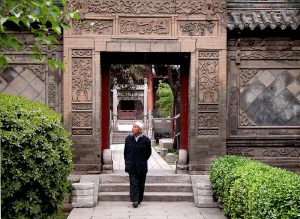While the mass persecution of the Uyghurs and other ethnic groups in Xinjiang is well-documented, the plight of the Hui is much less visible. Numbering around 10.5 million in the 2010 census, the Hui are a group of mostly Muslim people that live primarily in the provinces of Ningxia, Gansu, and Qinghai. They are regarded as culturally similar to the Han, China’s ethnic majority, due to their appearance, diet, and use of Mandarin as a mother tongue. Some experts argue that these similarities, paired with Huis’ geographic dispersion, have led to their status as China’s “preferred Muslims.” However, evidence suggests that the Hui are increasingly facing repression from within the state, with their cultural and religious practices being subjected to ever more stringent policies. The treatment of the Hui demands further investigation, fortified by a robust, coordinated international response.
In 2014, while the Uyghurs were enduring a religious crackdown, the Hui were enjoying a “religious boom.” An article in Time reported that this was due in part to the absence of a separatist movement in Hui communities. Oppression in Xinjiang is partially a response to the fact that some Uyghur groups have historically pushed for their own independent state. The Time piece was published a few years before reporting revealed the existence of internment camps in Xinjiang, the widespread forced sterilization of Uyghur women, and the countless other atrocities committed against the Uyghur population. Earlier discriminatory practices against this ethnic group, including new rules prohibiting residents with long beards and veils from using public transport, portended the systematic and ruthless treatment we are seeing in Xinjiang today.
Despite the perception that Hui communities have thus far avoided repression on the scale the Uyghurs have faced, there are warning signs of grievances brewing and discriminatory practices emerging that bear resemblance to those of Xinjiang in 2014. China’s official campaign to “sinicize” Islam in Hui communities has resulted in government officials ordering mosques to promote government-sanctioned values, such as socialism and traditional Han culture. This practice reflects a growing tendency in policymaking circles to conflate all of Islam with extremism – a likely byproduct of the government’s view that Chinese culture and the Communist Party are wholly superior to other cultures and faiths.
Growing intolerance for Islamic cultural expression has raised serious concerns in Hui communities. According to Maya Wang, China senior researcher at Human Rights Watch, the Huis are “definitely fearful” of growing Islamophobia in Chinese society and a “steady level of sinicization” that could translate into violence down the road. Indeed, there are clear examples that demonstrate this persecution. Under sinicization, Hui schools in Inner Mongolia and mosques in Ningxia were restructured and redesigned to bear more traditional Han architectural traits. Perhaps the most alarming and obvious sign of repression is the fact that Hui people living in Xinjiang have been incarcerated in internment camps along with Uyghurs, Kazakhs, and members of other ethnic groups.
One U.S.-based student Muslim activist described the treatment of the Hui as that of “a frog sitting in warm water that will eventually boil.” Given that Islamophobia in China does not distinguish between ethnic groups, it’s incumbent upon other countries to address the warning signs of repression. This can be done through a two-pronged approach.
First, states should ensure their national campaigns to protect freedom of religion in China account for all communities and religions, with the goal of applying pressure on China for all egregious human rights violations. The Chinese government has repeatedly shown its sensitivity to public criticism, aggressively shouting down any statements that might tarnish its international image. Condemnation wouldn’t only ramp up attention on China for its treatment of these ethnic groups – and therefore be more likely to influence actual change – but would also address global criticisms that Western countries like the United States “cherry pick” who to defend and when.
Second, states should investigate the treatment of Hui populations through engaging directly with communities on their lived experiences. Given China’s fierce opposition to interference in its internal affairs and the difficulty of gathering intelligence within the country, assessing the extent of discrimination against Hui communities might be challenging. However, foreign embassies should still seek to identify signs of repression and alert their home governments.
Creating more effective systems for consistent situational monitoring and evidence gathering on repression and grievance will help predict and prevent increases in persecution. A major lesson from the international response to mass atrocities like the Rwandan genocide is that states can be slow to act on early warning signs, while at the same time, escalation from these types of grievance to violence can be rapid. A more coordinated approach, which emphasizes a frequent exchange of information between country staff and national governments, could help prevent similar atrocities from occurring.
We shouldn’t automatically assume that a Xinjiang-style crackdown targeting Hui communities is inevitable. However, it’s clear that both the Uyghurs and Huis live under an authoritarian regime that treats deviations from its cultural and ideological standards with increasing ruthlessness – a state that one Hui academic, speaking under condition of anonymity, described simply as “chauvinist.” While entire Hui communities may not be incarcerated in internment camps, the signs of cultural erasure point to a subtle and pernicious form of persecution that is far more likely to go unnoticed, leading to a cultural wipeout occurring under the radar.
Countless tragedies in human history have presented clear warning signs. Ignoring these signs can lead to untellable pain and loss and set a precedent of impunity that generates even graver atrocities. Members of the international community need to investigate and engage more with domestic populations being repressed in China in order identify, call out, and halt these acts of repression before they escalate into extreme violence and atrocities.

































